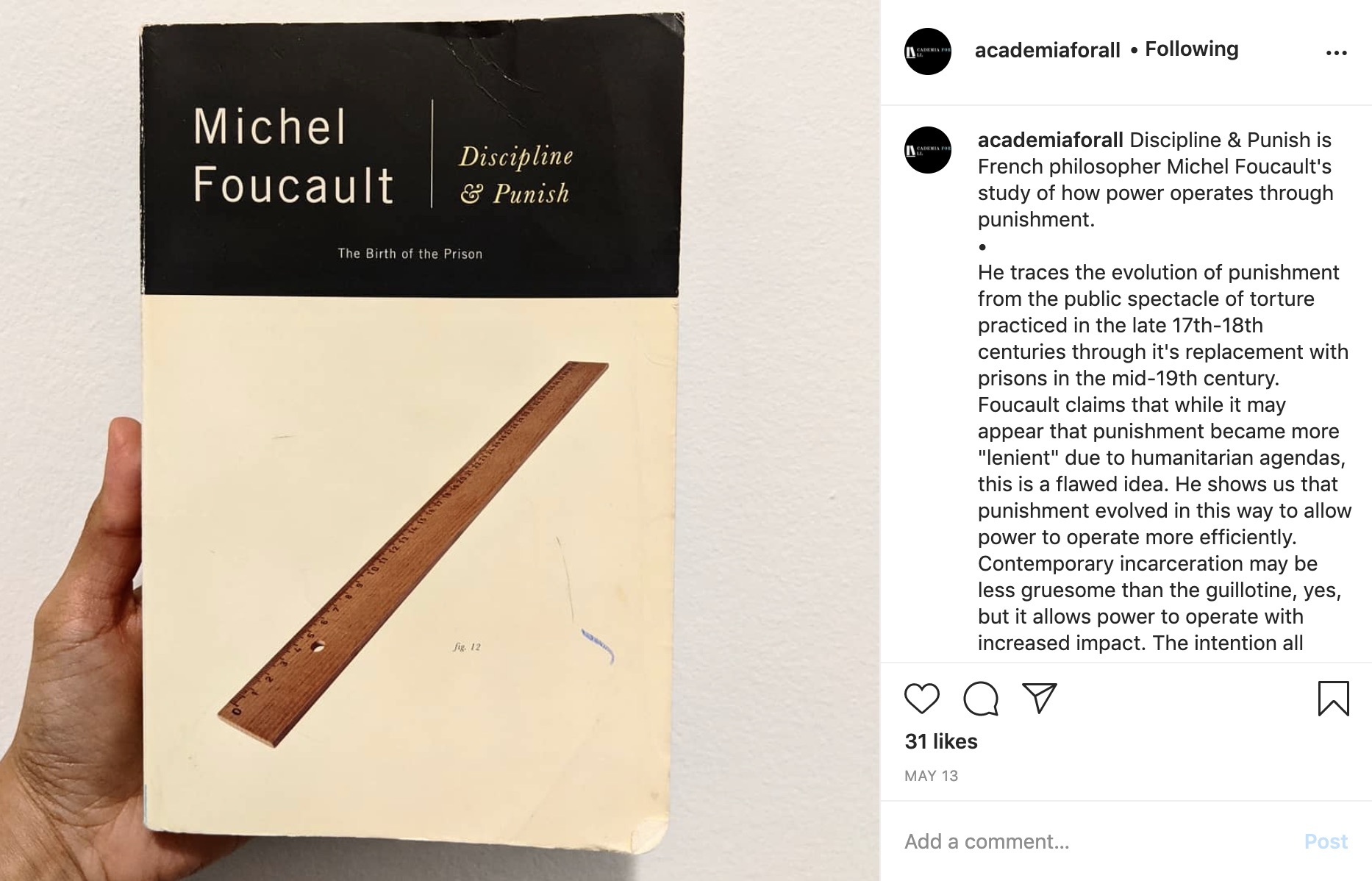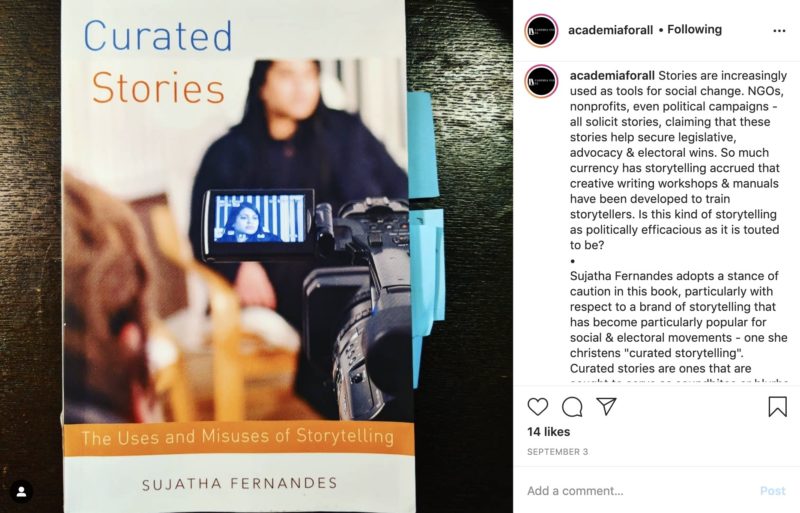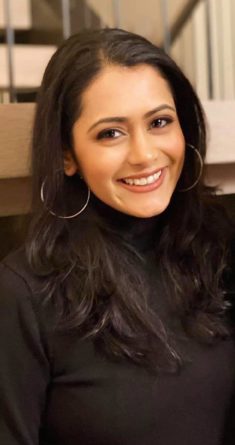Queenie Sukhadia
I formally created Academia for All––an Instagram account where I ‘translate’ scholarly humanities texts into bite-sized summaries for public audiences––in March this year. But this single, originary moment gathers hundreds of others, strewn across the years, within its folds. For instance, there was the moment when I turned the last page of Saidiya Hartman’s Lose Your Mother and realized that my family would be able to engage with it––with rich theorization––in a way that was made impossible by most other monographs lining my bookshelf; I wanted to open theory up, to make it an inviting space, like Hartman did. There was also the moment when I read a journal article on how patriarchal oppression works through female mouthpieces, through internalized misogyny, and I was able to make sense of why women far more than men had disciplined me into ‘ideal’ femininity. In that instance, I wanted others to experience that click, that systematic explanation for something that felt so individual, even if they had never touched a scholarly piece of writing in their lives. This project was also rooted in the moment when a friend refused to accept that race was a social construct, and I was instinctively appalled; later, I wondered what her stance would have been had she had access to the critical frameworks I worked with. I also wondered what she might have said, had I listened with an open mind, that could have challenged the thinking that scholarly frames had made commonsense for me; in that instance, I wanted to create a space for these conversations to occur, conversations that might shift public opinion but also conversations that might contradict what we in the university hold to be gospel.
When I decided to act on these motivations, the first choice I had to make was which platform I wanted to host this project on. I eventually homed in on Instagram for two reasons. First, it is already home to an active community of ‘bookstagrammers’—avid readers, who post and consume book-ish content on Instagram, be that book reviews or merely aesthetically appealing flatlays of book covers. While I noticed that a majority of this content focuses on fiction, I felt like Instagram provided me with an audience that already had a self-avowed interest in books, an audience that may stumble across and engage with my work. Second, while I initially gravitated towards writing a long-form blog, I pivoted to Instagram when I paused to reflect on the ways people consume content today. Most of us have busy lives and short attention spans, factors that get compounded when asking an audience to sit with theoretical concepts that demand additional cognitive labor to take in and process. As such, I wanted to minimize what I was asking of my audience. I realized that, if I wanted people to engage with my work, I would have to meet them where they are; I would have to insert this material into their everyday routines, into their idle thumb-flicks through social media so that their cognitive energy would be devoted to actually sitting with the ideas I was making available, rather than simply encountering them. The limited space of the Instagram caption was an additional plus—it would compel me to pare down my summaries. While I may think every nuance of an argument is important, if I want people who don’t work with this material for a living to engage with it, I need to strip it down to its bare bones.

While my Instagram page has only been running for a few months, it has been a generative learning experience for me, specifically in terms of the insights it has yielded about public humanities work and the university itself. I developed this project for publics outside the university, for those who do not engage with scholarly thought on a day-to-day basis. However, I have noticed that a large proportion of individuals that engage with my project share some relationship with the university. On one hand, this compelled me to reckon with and be open to how projects can find their own audiences; on the other, it made me reconsider the artificiality of the binary between those inside the university and those outside of it. This latter point was further hammered in when several of my doctoral student friends mentioned how my project helped expose them to new fields of thought outside their own narrow specializations. These comments flagged for me how all of us inhabiting the university are perennial learners, irrespective of the stage we’re at in our intellectual journeys, a fact that becomes all the more salient considering the artificial disciplinary divisions the university segments knowledge into. By reflecting on this actively, I have become increasingly attentive to how the publics I am engaging with, through my work, are distributed widely—framing them in terms of an inside-outside dichotomy is too reductive to sustain.
Finally, as I continue to work on this project, I repeatedly question why people should engage with it. Recursively returning to this question has been an exercise in humility for me—it has helped me underscore for myself that even though I believe deeply in the merit of the work I am doing, it is imperative that I displace scholarly production and the institution of the university from the pedestal I, like many others, place it on. Social justice commitments and a sharp awareness of the intersecting power axes within which we are entangled are not cultivated exclusively in the university. The work we do here is only one node in a rich ecosystem of social justice apparatuses, and even as I it hold up for the world to see through my Instagram page, I am constantly reminding myself to localize it—for myself in the present and more tangibly through Academia for All, in the future, as my project evolves further.
Despite discussing my project at length in this essay and swaddling it in an aura of intentionality, I would like to close by noting how it is still very much in flux, still unfinished in terms of process. I have many questions that I’m still working through: How do I animate the comments section of my Instagram page with discussion, questions, criticism—from those who think like me, but also from those that don’t? How do I offer up these theoretical ideas I find fascinating without holding them up as authoritative and final? How do I develop a listening presence through my page, even though the platform and work itself demands a ventriloquized-type speaking from me? These, among others, are questions I do not yet have answers to. And yet, the thickness of these questions leaves me more hopeful than helpless because perhaps, this is the work of the public humanities: to renounce mastery, to constantly adapt and revise, to accept that I won’t always know, and that’s okay.

